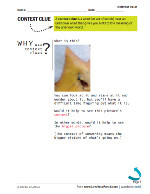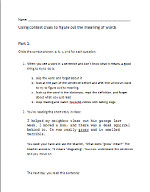Use context clues to build vocabulary
When you see a word that you don't recognize, don't just skip it, and don't let it frustrate you. Look at the groups of words before and after the unknown word to help you figure out what it means.
Printable guide

Click to download the printable guide
Assessment

Click to download the assessment
Video
Using context clues
Let's say you have a sentence with an unknown word:
Even when Mr. Ruiz was younger, he almost never came out of his house. But now, as he's gotten older, he's become even more reclusive. We never see anyone visit him, and he never comes out of his house to speak with anyone.
Do you know what reclusive means? Let's take a look at some good context clues:
Even when Mr. Ruiz was younger, he almost never came out of his house. But now, as he's gotten older, he's become even more reclusive. We never see anyone visit him, and he never comes out of his house to speak with anyone.
Can you guess what reclusive might mean? Hint: it doesn't mean happy, and it doesn't mean funny. You may not know exactly what it means, but you're probably close to its real meaning: in the habit of keeping to yourself and your private home; unwilling to talk and spend time with people.
Because you looked at the words in the neighborhood of (in the context of) the unknown word, you figured out what it probably means. This is a lot better than just skipping the word and not learning it, right?
For more, download the free Learning Activity and assessment, and watch the video!